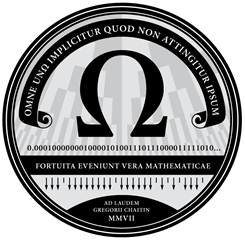CH 53: More Incompleteness
One of the leading researchers who have furthered the idea of incompleteness discussed in chapter 20 is the mathematician Gregory Chaitin. He came up with a concept he calls the Omega number. It is the centerpiece of the idea that in truly pure mathematics, there is always inherent in it an element of randomness. This fact means that all theories and concepts in math, no matter how effective or elegant, will always be tinged with incompleteness to them. This then might rule out any “permanent” Theory of Everything (TOE), since a TOE is meant to be complete and the Omega number ensures that it cannot be so.
The concept of the Omega number is related to the Turing machine. The Turing machine was a model of the first digital computer. As soon as you start thinking about a computer program, you then must think of algorithms. An important first question when thinking of algorithms is whether any particular program is designed to stop. As was proven by Turing, there exists no test that can determine if any given program will halt or not.
Now enters the Omega number, which is the probability that any given program will halt. The Omega number is irreducible, or to put it another way, algorithmically random or to put it another way, not something that can be computed. So when a number is algorithmically random, that makes it maximally unknowable, and therefore infinitely complex. However, in a TOE, it must have finite complexity in order to be a theory, and it must be able to calculate the Omega number to truly be considered a TOE but since the Omega number is unable to be deduced, so then must a TOE be out of our grasp.

Lots of luck trying to compute Ω




